

Poker is a game of chance, with players betting to win the pot. It is an ideal game for beginners, but it can also be fun for experienced players. It requires discipline and perseverance, as well as sharp focus. It is important to choose the right limits and variations for your bankroll, as well as participate in games that are profitable.
In the early stages of learning to play poker, it’s important to get a good understanding of the game rules and strategies. This will give you a clearer picture of the game and help you develop your own game plan.
There are a number of different types of poker, but the most common is Texas Hold ‘Em. It is played with a 52 card deck, and can be played by two to seven players. The dealer deals cards face down, and each player has a turn to check or bet. The highest card wins the hand, unless there is a tie, or everyone has busted.
If you’re a beginner, it’s important to understand which hands are strong and which ones are weak. This will allow you to make better decisions and avoid losing money in high stakes games.
It’s also important to know which hands offer the lowest odds of winning, as this will determine how much you should be willing to wager. You shouldn’t fold a hand with an ace on the flop, for example, even if it’s a very strong hand, as that is not likely to get you anywhere.
Don’t Overplay Your Strength:
A common mistake that amateur poker players make is playing their strong hands too aggressively. This can lead to a loss of money, especially when it’s a small pot. The pros, on the other hand, tend to be very conservative and don’t overplay their hands.
Read your opponents:
One of the most important skills for any poker player is reading other players. By paying close attention to their actions, you can pick up on patterns that indicate what type of hand they are holding. This is a very simple concept but it’s an important one to get your head around, as it’s the basis for a lot of poker strategy.
When you first start out, it’s a good idea to practice with a small pot. This way, you can see how you react when you lose and gain experience without risking too much money.
Then, you can practice with a large pot to gain some more experience and learn how to control your emotions. This is a critical skill in the game of poker, as you need to be able to stay focused and not let any negative emotions distract you from your game.
Once you’re comfortable with the fundamentals of poker, it’s time to take your game to the next level. This will require a bit of strategy and discipline, but it’s well worth the effort.